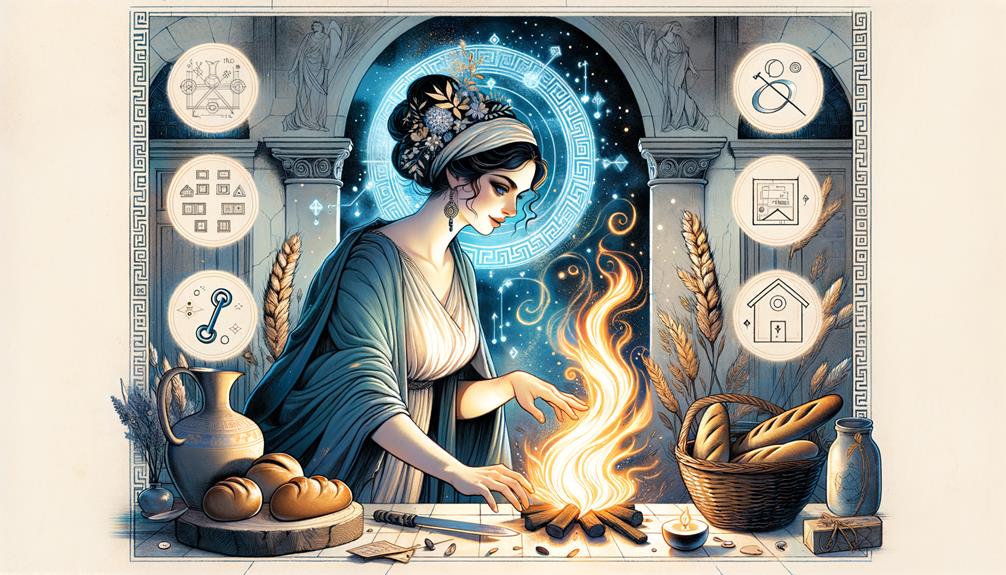Hestia, the ancient Greek goddess of the hearth, had a significant impact on household rituals and the unity of families. She was the offspring of Titans Cronus and Rhea, and her siblings included Zeus, Hera, Poseidon, Demeter, and Hades. Rather than getting tangled up in the drama of marriage, she chose solitude, creating an atmosphere of serenity. Her influence can be seen in household rituals even today. She was the one who maintained the family's hearth, ensuring warmth and comfort, fostering a safe and harmonious environment. The symbols often associated with her, the hearth and flames, are testaments of her belief in unity, safety, and family bonds. Essentially, she was a mediator, her peaceful interactions became a model for peaceful family relationships in Greek mythology. If you're interested in learning more, her subtle presence in Greek myths adds a fascinating depth to her story.
Hestias Role in Greek Mythology
When we talk about Greek mythology, we can't overlook Hestia – the goddess of the hearth. She held a lot of sway in ancient Greece, and her significance really brings to light how much they valued the concepts of home, guest-friendship, and community.
Hestia, as a goddess, was seen as the embodiment of everything related to home and family life. She stood for the unity and harmony within a family. Now, her realm, the hearth, was more than just a physical space. It symbolized a peaceful and steady home.
But her influence didn't just stop at being a symbol. She had a hand in the rituals that were carried out around the hearth. This only drove home the point of how crucial her blessings were for a peaceful and harmonious domestic life.
One thing that made Hestia stand out was her peaceful nature. She was a calm presence among the other gods, who were often embroiled in chaos and conflict. This only served to strengthen her image as a beacon of calm in the stormy world of Greek mythology.
Family Ties of Goddess Hestia
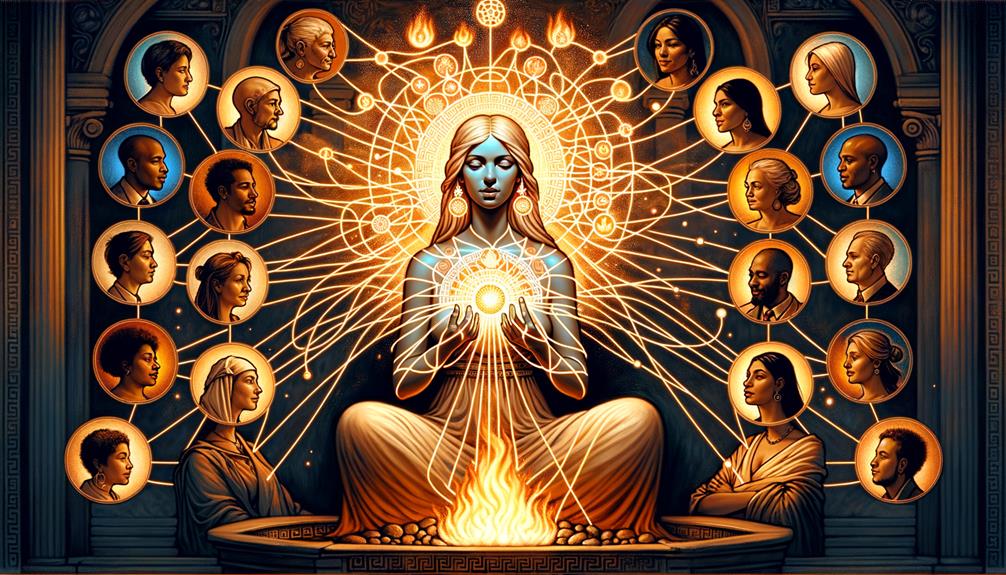
Let's chat about Hestia's family tree. She's the daughter of the Titans Cronus and Rhea, which puts her in the same sibling group as some big names in Greek mythology. Think Zeus, Hera, Poseidon, Demeter, and Hades. These family ties had a significant impact on her responsibilities as the goddess of the hearth, a symbol for family togetherness and domestic peace.
Hestia was always on good terms with her brothers and sisters and the rest of the Greek gods. Even when Poseidon and Apollo asked her to marry them, she said no thanks. She chose to stay unmarried, which was her way of staying true to her divine job of promoting peaceful households. She didn't want any part of the drama that usually comes with marriages among the Greek gods.
Hestia's commitment to peace within her family makes her stand out. It sets her apart as a unique character in Greek mythology.
Hestias Divine Abilities and Symbols
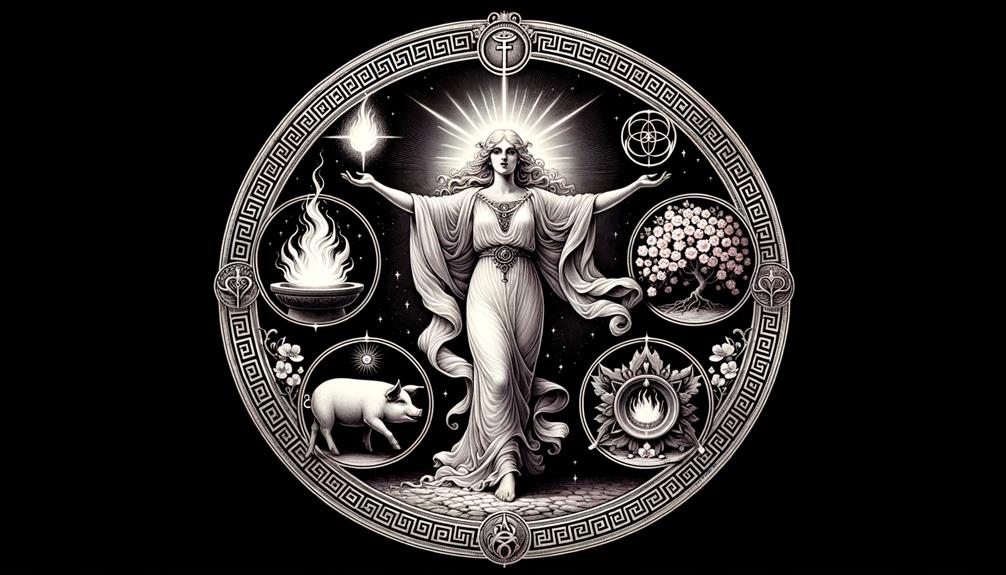
Taking a closer look at Hestia's divine capabilities and her symbolic representations, it's evident that they're deeply intertwined with the ideas of warmth, solace, and unity within the household. Hestia, the Greek Goddess of the hearth, has an influence that transcends the literal fire and encompasses the holiness and congeniality of home life. Her connection to the everlasting flame signifies not merely warmth, but also purity and safeguarding. She stands as a symbol of harmony, assuring security and nurturing family connections.
Here's a brief rundown:
| Hestia's Divine Abilities | Hestia's Symbols |
|---|---|
| She oversees the hearth, ensuring warmth and comfort | Hearth and flames |
| She assures safety and promotes harmony within the family | Everlasting flame |
| She blesses residences and maintains the sanctity of home life | Hearth as the heart of the home |
These aspects neatly summarize Hestia's substantial influence on family and home.
Myths Surrounding Goddess Hestia
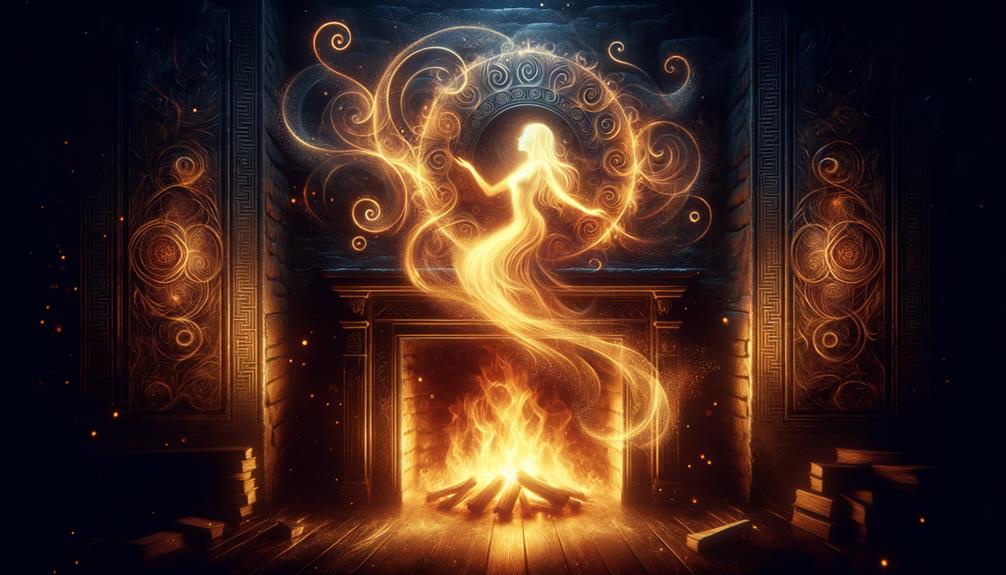
When talking about Goddess Hestia's mythology, let's appreciate her crucial role and the sacred symbols she represents. Her commitment to lifelong virginity is quite unique, and her peaceful interactions with other gods and goddesses are noteworthy. These stories highlight the importance of purity, familial ties, and peace. People worshipped her in both public and private, emphasizing the value they placed on home, community, and unity in ancient Greek society. This was not just in their personal lives but also in their communal interactions.
Hestias Role in Mythology
Even though Hestia doesn't star in as many myths as some other Olympian gods, you can't overlook her vital role in mythology. Think about tales like her encounter with Priapus, the donkey, and Dionysus's journey up Mount Olympus. These narratives really highlight her clout. As the Greek deity of the family hearth, her influence was felt in every household in ancient Greece. Let's look at a few crucial points:
- Hestia gave up her throne on Mount Olympus to Dionysus to avoid having 13 Olympian Gods — a number believed to bring bad luck.
- The Vestal Virgins, Hestia's dedicated priestesses, represented her virtue and dedication to the home deities.
- Hymn 24 to Hestia really drives home her position within the pantheon.
- Even though she stepped down, Hestia's significance as the goddess of the hearth remained strong.
Let's keep things simple, relevant, and avoid overused phrases. By using straightforward language, we can deliver the message clearly. Remember, we're writing for readers who want to learn about mythology, not rocket science. By providing the context, we can make the content engaging and easier to understand. Instead of saying that something is 'important,' let's explain why it's significant. Let's make our writing sound like a friendly conversation, not a lecture. And, above all, let's make sure our writing is clear, direct, and easy to understand.
Understanding Hestias Sacred Symbolism
If you want to really get Hestia, you need to delve into her sacred symbols. Take the hearth, for instance. In the stories of Greek mythology, the hearth represents safety, warmth, and a strong sense of family. Hestia, being the one who always keeps the hearth fire burning, stands as a symbol of her unwavering, divine presence in everyday life.
The hearth was more than just a vital source of heat in homes and temples. It also had a spiritual dimension, promoting peace and stability. It was deeply connected to religious rituals, with people making offerings and prayers to the Goddess. This created a link between humans and the divine.
When you delve into these old tales, you can see how Hestia's influence runs deep in Greek culture, underlining the importance of the hearth as a sacred symbol. It stood for family unity and protection, elements that were central to their way of life.
Hestia and Roman Goddess Vesta
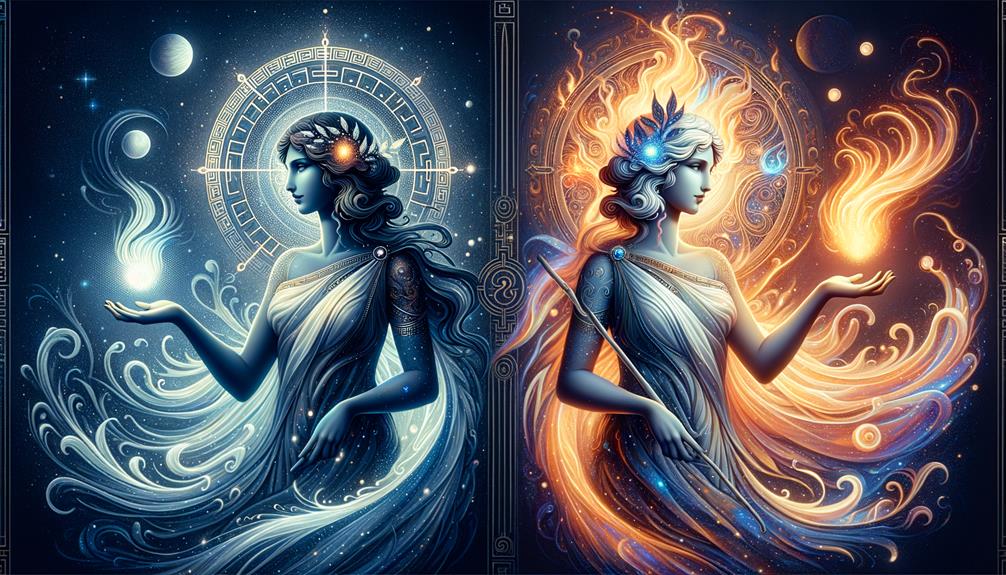
Let's chat about Hestia and Vesta, two goddesses from Greek and Roman mythology who both had a thing for the hearth and home. Despite having a lot in common, like their shared role as the protector of the home and the sacred flame, the way people worshipped them was pretty different.
So, first off, both Hestia and Vesta were all about that home life. They were the ones to turn to for keeping things happy and peaceful around the house.
But here's where things get interesting. Even though they had a lot in common, people worshipped Vesta in a more public way, while Hestia was more of a homebody.
And then there's the whole thing with the Vestal Virgins. They were dedicated to keeping Vesta's sacred flame alive, which was a pretty big deal back in the day. But this was a duty that didn't really come up in the worship of Hestia.
However, both goddesses did have one more thing in common—they were all about fostering harmony, not just in homes, but also in communities.
This all goes to show that even though these two goddesses had a lot in common, the way they were worshipped reflects the different cultural vibes between the Greeks and Romans. Vesta had a stronger presence in Roman religious practices, which gives us a bit of insight into their societal differences.
Unanswered Questions About Hestia
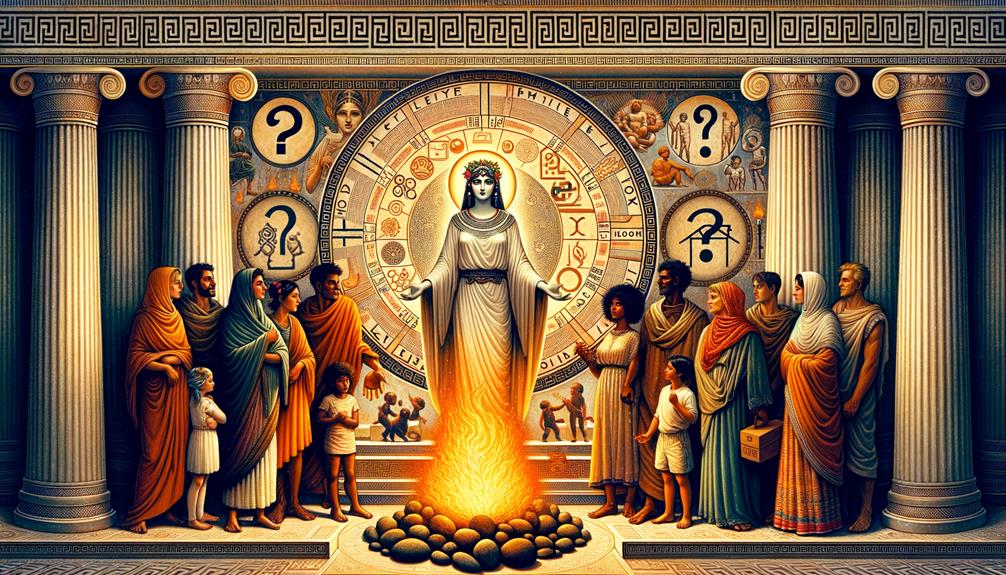
There's something fascinating about Hestia, the Greek goddess, and the mysteries that surround her. For starters, we're not entirely sure about her exact origin story or the circumstances of her birth within the Greek mythology world. It makes you wonder, doesn't it? Then there's the story about her rejecting marriage proposals from Poseidon and Apollo, two of the most powerful gods in Greek mythology. What made her say no to them? And why did she make a vow of eternal chastity to Zeus, choosing to stay a virgin goddess?
Her role in some of the major stories of mythology is also quite elusive, which adds to our curiosity. Plus, she had this unique role in preserving family unity and bestowing blessings on the hearth. It makes us question her impact on ancient Greek society. Wouldn't you love to unravel these mysteries surrounding Hestia? It could certainly give us a more profound understanding of her lasting legacy.
Frequently Asked Questions
What Was Hestia Area of Influence?
Hestia, the Greek goddess of the hearth, had quite an impressive reach. Her influence wasn't confined to just the fireplace, though. No, Hestia had a hand in all things home, family, and unity. See, she was the one who ensured peace and harmony within the household. And her area of influence didn't stop at the front door – it extended to the public hearths throughout the city. She was all about creating a sense of community, where everyone felt a part of something bigger. So, in essence, Hestia was the goddess of domestic bliss and communal unity.
What Does Hestia's Hearth Represent?
The hearth of Hestia is like a symbol for the heart of the home and the bond that holds a family together. It's a special place where people make offerings and say prayers. It's all about the daily life of a family, welcoming guests, and keeping traditions alive. It helps to create a sense of community and security, just like the never-ending flame of Hestia.
What Is Hestia Most Associated With?
When you think of Hestia, what comes to mind? Well, she's best known for her connection to the home and the hearth. She's a symbol of the comfort and security that comes with a warm, welcoming home. She stands for the unity of the family, overseeing the day-to-day happenings within the household and promoting a peaceful atmosphere. Her sacred flame is a representation of her presence, always burning, always watching over us.
How Did Hestia Interact With Humans?
As Hestia, my interactions with humans were quite intimate and involved. I took care of their hearths, making sure their fires were always burning. Whenever rituals were held, I was the one to receive the initial offerings. Blessing newborns was another of my duties, and I was often acknowledged during meals. Additionally, I imparted knowledge to humans on how to construct homes.

